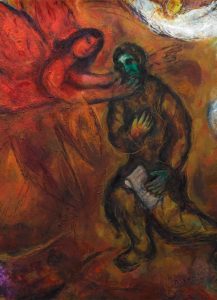Ord Om ordet
Advent med Jesaja
Meditasjon holdt ved en adventsgudstjeneste ved Oratoriet i York
The prophet Isaiah is the mainstay of our Advent liturgy, which lets us hear a range of hopeful texts from his treasury.
Many motifs of Advent and Christmas iconography come from Isaiah, like the chief motifs of the O Antiphons. Isaiah gives us the ox and the ass. From him we have the promise: ‘A Virgin shall conceive.’ Isaiah calls, ‘Comfort ye!’ He heralds those who ‘bring a gospel of peace’, by which swords will be beaten into ploughshares. ‘Emmanuel’, the beloved name, is revealed by Isaiah, who paints a picture of lion and lamb lying down together, every impulse of strife removed from earth.
Not for nothing did Paul Claudel speak of ‘the Gospel of Isaiah’. How near Christ seems in his prophecy!
The light that shines in Isaiah, though, shines in darkness. His luminous visions are offset by a backdrop of chaos, violence, fear. We hear this context set out, too, each Advent. We hear, but do we listen? Isaiah is an unsettling book. It presents mankind corrupted by vice, idolatry, and selfishness, wanting political integrity. Jerusalem, the city on the hilltop, appears as a pit. There is no credible authority. People spend their best efforts on vanities and pleasure. When disaster strikes, there is nothing to unite them: ‘People will oppress one another, every man his fellow, every man his neighbour; the youth will be insolent to the elder, and the base fellow to the honourable.’ How could such misery befall? ‘For want of knowledge’, Isaiah tells us. Absence of reflection caused a breakdown of understanding. For too long, no one had bothered to discern what was really going on. Categories of truth and falsehood had eroded, with everyone ready ‘to call evil good and good evil’, putting ‘bitter for sweet’.
‘Woe’, cries Isaiah: ‘Woe!’
Social order in Jerusalem collapsed because it lacked consistency, true. But there is more to the story. Jerusalem fell because the Lord caused it to fall — the Lord, who ‘dwells in Jerusalem’! This is the scandal of Isaiah. He proclaims that God is behind the destruction of the city known as his. He takes away from Jerusalem ‘stay and staff’. He smites its daughters with scab. To the clergy who try to appease him with liturgies, he says: ‘I have had enough.’ The Lord stands to judge, pulling down what once he had built up. He fells Zion’s mighty oak. Why?
So that a stump might remain. The Lord is not concerned with imposing growth. What matters to him is to preserve the ‘holy seed’, the principle of Israel’s vocation. The people had forgotten that seed and where it came from, seduced by what they thought was a life, and a strength, of their own. Self-confidence had blinded them. It had, one way or another, to be punctured. It couldn’t but be painful. When the prophet asks, ‘How long?’, God replies: ‘Until the land is desolate.’ Clutching their ‘headbands, anklets, perfume boxes, amulets, and handbags’, the people are fearful. So frightened are they that their hearts shake ‘as the trees of the forest shake before the wind’. That’s quite some shaking. These are the hearts to which the sign of Emmanuel is given. The fact is worth remembering.
For this build-up to the Christmas Gospel seems strangely familiar now. Our world is anxious. War rages in Europe. Governments collapse one after the other. In the Middle East anything could happen. Extreme weathers remind us that we are at the mercy of processes beyond our control. What John Paul II called ‘the culture of death’ encroaches, getting itself enshrined in legislation. And of course, Europe hasn’t reproduced itself for years. It seems to have lost its will to live, all the while listening out for the footfall of the foe. Who is he? And where? We do not know: that’s what disturbs.
The trauma searing Europe today feels more like sickness than war. And is it not true that our continent is sick? Is the drama now unfolding not the visible symptom on the body politic of a virus that has long raged invisibly within?
You may ask what this has to do with Isaiah’s theology? A lot, I’d say. We see, like he saw, the birth pangs of a world reconfiguring itself. They are fearful. Birth pangs are. But who is to say that the Lord is not in this somehow, he ‘who creates weal and makes woe’. Is the collapse of an old order his way, now, of making something new? Our God, after all, is Lord of history. He, who has given us his Word, bids us, too, read the signs of the times. We mustn’t be like the Jerusalemites of old, ‘without understanding’.
Let’s listen, pray, and respond to God’s call with our lives.
When we cry out, ‘Come, Emmanuel’, it is no casual mantra. The promise of God-with-us is no fairytale. Jesus Christ, eternal Son of the Father, is with us now. He lives, stronger than all evil. He reigns as Prince of Peace. Faced with perplexity and pain, we can stand upright in him.
Advent asks us to believe profoundly in Christ’s promise, to show ourselves worthy of it, to love Christ with all our hearts. Then our hope will be more than sentiment; it will have substance. The morning star will arise, then, in our hearts. Night will flee.
Isaiah said, centuries ago:
Do not call conspiracy all that this people call conspiracy, do not fear what they fear, nor be in dread. But the Lord of hosts, him you shall regard as holy; let him be your fear, let him be your dread. And he will become a sanctuary.
Come, Lord Jesus!
Grant us wisdom to see and understand!
Keep us faithful, trustful, peaceful!
Hallowed be your name!
Amen.

Marc Chagall, Le Prophète Isaie (1968): Musée national Marc Chagall.
